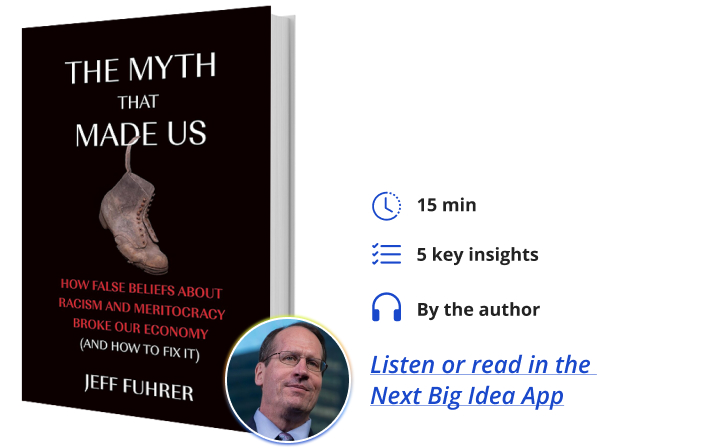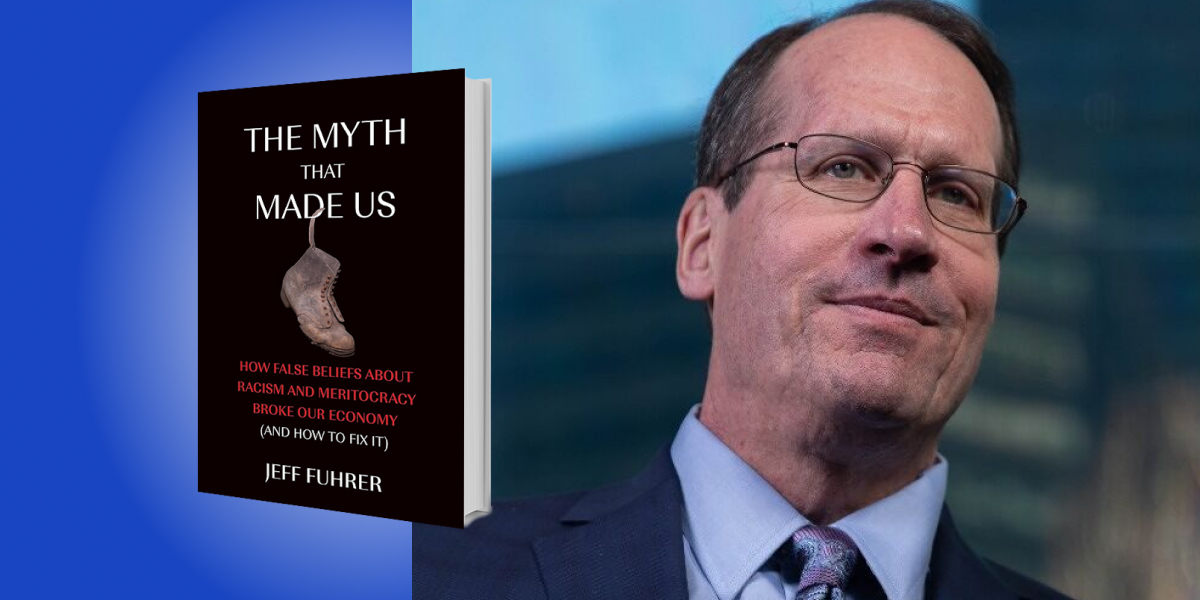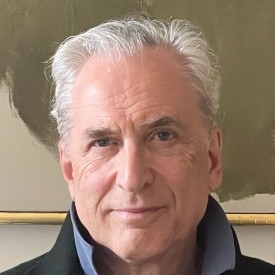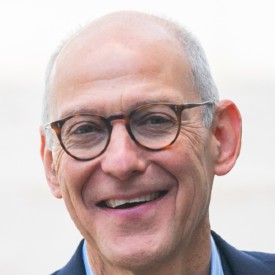Jeff Fuhrer is a Nonresident Fellow at the Brookings Institution and a Foundation Fellow for the Eastern Bank Foundation. Jeff previously served as director of research, executive vice president, and senior policy advisor at the Federal Reserve Bank of Boston. He has published numerous scholarly papers on the interactions among monetary policy, inflation, consumer spending, and asset prices. Fuhrer earned an AB in economics, graduating first in the department with highest honors from Princeton University. He received his MA and PhD in economics from Harvard University.
Below, Jeff shares four key insights from his new book, The Myth That Made Us: How False Beliefs about Racism and Meritocracy Broke Our Economy (and How to Fix It). Listen to the audio version—read by Jeff himself—in the Next Big Idea App.

1. Race plays a role in our economy.
In 1968, 55 years ago, the Rev. Martin Luther King Jr said, “At the very same time that the government refused to give the Negro any land, through an act of Congress, our Government was giving away millions of acres of land in the west and the midwest, which meant it was willing to undergird its white peasants from Europe with an economic floor. But not only did they give the land, they built land grant colleges with government money to teach them how to farm; not only that, they provided county agents to further their expertise in farming; not only that, they provided low-interest rates in order that they could mechanize their farms; not only that, today, many of these people are receiving millions of dollars in federal subsidies not to farm, and they are the very people telling the Black man that he ought to lift himself by his own bootstraps. Now, when we come to Washington in this campaign, we are coming to get our check.”
I want to emphasize two takeaways from this powerful speech. First, Dr. King recognized 55 years ago the ways in which our government had created, through institutional discrimination, a highly favorable and government-supported economy for white farmers, denying the same to people of color. That’s the “check” he says Black Americans are coming to get—the one that white farmers already got, many times over. While many remember the “I Have a Dream” speech, fewer remember this more incisive analysis of how our government created and supported a racially divided economy. It is likely that he was murdered for this message, a message as relevant today as it was in 1968.
The second takeaway is that this speech makes it clear that the effects of government and nationwide economic discrimination are perpetrated over generations, and last for generations afterward. Economic discrimination continues. The effects of current and previous discrimination are with us today, as evidenced by the enormous gaps in wealth, health care provision, incarceration, and income, to name a few.
2. The sole purpose of large businesses is to enrich their stockholders, not so much their employees.
According to that model, businesses are responsible solely for maximizing profits, or roughly the same, making their shareholders richer (note that I’m talking primarily here about large companies that have shareholders). In service of this narrative, companies have restrained wage growth, limited health and childcare benefits, outsourced jobs to third-party providers, distanced workers from their employers, and reduced the opportunity to advance—all in the name of keeping profits high and shareholders happy. And the largest corporations have indeed maximized profits—profits are currently at or near historic highs.
“The narrative and the system need to change.”
I’d worry somewhat less about that if accumulated profits were used for productive, innovative, and life-enhancing purposes. Some are. But of the $2.5 trillion in profits accrued last year, more than $1 trillion was used to buy back company shares—to artificially prop up stock prices. Who benefits from that? The wealthy who own shares. Who loses? Workers.
There’s a moral implication here—how can you as the CEO of a highly profitable company send your employees home with so little pay that they can’t survive without the help of government benefits, like food stamps and housing assistance? And just as bad, this corporate behavior means that other taxpayers, as a consequence, must subsidize the labor costs of large corporations. As taxpayers, we fund much-needed government programs that are required precisely because they pick up the slack corporations leave behind by paying such low wages and offering such poor benefits. Given the way large corporations behave, I’m more than happy to pay my share of these essential benefits, which keep many families alive. But I’m not happy that corporations benefit from this implicit welfare, while walking away with astounding profits. This business narrative has created a mess, a disaster for millions of American workers. The narrative and the system need to change.
3. The false meritocracy narrative tells us that everyone gets exactly what they deserve, according to their effort.
This narrative has wildly distorted our conception of the poor. If everyone gets what he deserves, then the poor deserve their poverty. Clearly, the thinking goes, they are poor because they didn’t work hard enough—they’re lazy, and they’ve made bad decisions. This is quite simply false. Instead, history and data tell us poverty largely results from differences in race, ethnicity, gender, and inherited family resources. But our country loves to blame the poor for their plight. What would struggling families do if we offered them more support? Squander it? The narrative says yes.
But history and data say no. The poor are among our very hardest workers. They are remarkably skillful in stewarding their resources—because they have to be! How do they spend the money they receive? On what we all have to: food and diapers and other necessities. To believe otherwise is to be willfully ignorant of the data and history concerning the poor.
Blaming the poor for their poverty has shaped our government’s safety net programs—leaving them minimal, stingy, distrustful of recipients, and always suspicious of abuse, in spite of the evidence. As a nation, we have left tens of millions struggling to survive, in spite of their hard work, determination, and persistence. We prefer to believe it’s their fault, rather than acknowledge our nation’s responsibility for their lack of opportunity.
4. Of course, income inequality matters, but painfully low incomes matter much more.
In most discussions of poverty, the focus is on income inequality—the difference between very high and low incomes. But I am even more concerned about the absolutely low level of incomes, especially relative to any reasonable estimate of the cost of essentials.
“To put it simply: We broke this economy.”
As my grad school advisor Ben Friedman of Harvard says, no one worries that the lowest-paid MLB player makes only one percent of the star ballplayer’s pay. Why? Because the lowest MLB salaries are really high—currently $720,000. Sure, the inequality is large. But the high level of all baseball salaries makes concern about inequality a bit silly. In stark contrast, I worry a lot about the family of four that lives on $55,000 per year—roughly double the poverty level—not so much because they make only one percent of the top earners in the country, but because, unlike baseball players, their incomes are just incredibly low. In fact, they are so low that the data show clearly that these families can’t afford to meet basic expenses anywhere in the country, even after accounting for government support. Of course, income inequality matters. But painfully low incomes matter much more.
How we as a nation think about the causes of wealth and income disparities has dramatically shaped how the economy works. We have chosen an economy that wildly benefits the white and wealthy, and leaves behind tens of millions of others. Those choices have been fueled by the myths of meritocracy, post-racism, the profit-maximizing firm, and free markets. There may be some truth to some of those myths. But by and large, they are poor descriptions of reality that have motivated us to become a stingy nation with an uninformed view of the lives and challenges of families of color and of the poor. To put it simply: We broke this economy. We should fix it.
To listen to the audio version read by author Jeff Fuhrer, download the Next Big Idea App today:
































